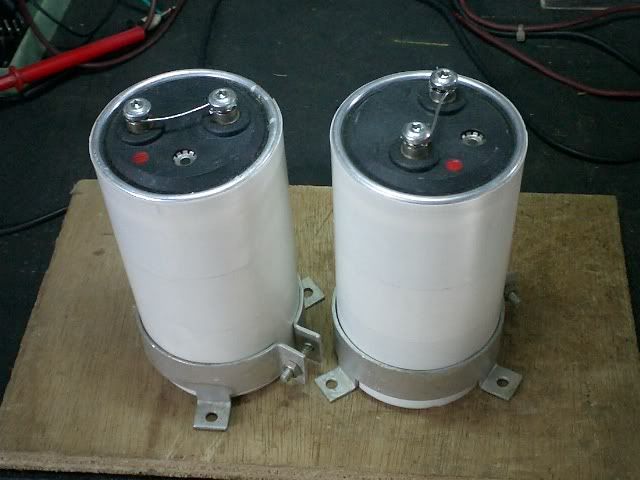pedroskova said:
...not sure what you're getting at, but if it's equivalent energy storage, a 100uF capacitor with 600volts across it stores the same amount of energy as a 100,000uF cap at 18volts.
Were you serious about the motor run caps for an amplifier power supply?
believe me, some have, i've seen pictures on here of it. oil caps are bulky, and sometimes leaky...
Andre Visser said:
Were you serious about the motor run caps for an amplifier power supply?
Absolutely...low ESR and as tough as nails. They are rated for VAC at very high currents. So, the 600V example is actually safe for use out past 1000VDC.
I've never heard of one becoming leaky.
Don't confuse "motor run" with "motor start"...two different beasts.
pedroskova said:
Absolutely...low ESR and as tough as nails. They are rated for VAC at very high currents. So, the 600V example is actually safe for use out past 1000VDC.
I've never heard of one becoming leaky.
Don't confuse "motor run" with "motor start"...two different beasts.
I have a friend whose grandfather used to test 'bathtub' capacitors by charging them up and seeing which ones drew the biggest spark. He must have figured those had the lowest ESR. Those were the days, cascade dual 45's in push pull with interstage transformers, even before Williamson. He worked for Simplex Cable and helped lay the transatlantic cable.
What is fun, Scott, is to leave charged caps around the lab! Yes, it used to be done. Some caps will even shock you plenty, without being charged. Why? Not for you to answer, Scott. Let's see if anyone else out there has a clue.
john curl said:What is fun, Scott, is to leave charged caps around the lab! Yes, it used to be done. Some caps will even shock you plenty, without being charged. Why? Not for you to answer, Scott. Let's see if anyone else out there has a clue.
Dielectric Absorption (aka 'soakage').
But I guess they would have to have been charged at some previous time, for that to work.
Dielectric Absorption (aka 'soakage').
that is why it makes good practice to short out the terminals when capacitors are to be stored over long periods.....

john curl said:What is fun, Scott, is to leave charged caps around the lab! Yes, it used to be done. Some caps will even shock you plenty, without being charged. Why? Not for you to answer, Scott. Let's see if anyone else out there has a clue.
Then there's the question of getting a shock from touching a doorknob mounted in a wooden door (no ground connection)??
Or what is ground for an airplanes electronics?
Caps can be lethal.
I don't know what the standard practice is in solid state, but a beefy bleeder resistor across at least one cap in a tube psu is needed if one doesn't want a nasty surprise while working on a "dead" circuit.
Originally posted by schumpe Don't tell me I don't have enough experience either, cause A) you don't know me and B) experience is not always a good thing anyway, common sense is definitely better.
In This is Your Brain on Music Daniel Leviton states that scientists are in general agreement that it takes ~10,000 hours of peactise to become expert at anything. Have you had 10,000 hours of serious listening discrimination practise?
BTW, this book is a must read for anyone interested in hifi.
dave
john curl said:You still don't know WHY!
Dielectric memory...or something like that. I tend to forget things easily these days.
john curl said:Mike, you have no clue of what is going on. Caps can be lethal.
Your kidding, right? A bit of a harsh approach, but obviously kidding...
The first question was just a similar line of thought as to why one might discharge to a NON previously charged cap and the second thought was connected to the first (if one cares to think a little).
I guess it was OT, sorry bout that.
- Status
- Not open for further replies.
- Home
- Amplifiers
- Solid State
- Do all audio amplifiers really sound the same???